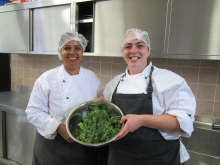Summary
What's on the menu?

Food systems activities produce greenhouse gases that contribute to climate change. They are a primary cause of environmental degradation and significantly contribute to socio-economic and health inequalities. Only a food systems approach can identify effective actions to accelerate climate impacts and reduce inequalities.
Since 2013, URBACT has supported 11 networks to learn from each other on the topics of sustainable food and urban agriculture :
- Food Corridors - empowering rural & urban food connections within European regions
- BioCanteens #1 and #2 - ensuring the distribution of sustainable school meals as a lever towards an integrated local agri-food approach
- RU:rban and RU:rban Second Wave - transferring Rome’s management model of urban gardens
- BeePathNet and BeePathNet Reloaded - enriching the urban jungle with bees
- Sustainable Food in Urban Communities - developing low-carbon and resource-efficient urban food systems
- Agri-Urban - rethinking agri-food production in small and medium-sized cities
- Diet for a Green Planet – addressing the environmental impact of food systems
- Next Agri - creating new skills for new jobs in peri-urban agriculture
Thanks to URBACT, more than 60 cities have led the transition towards more sustainable local food ecosystems. URBACT is pulling together the insights from these cities and beyond to help cities take action. Check all the ingredients below!
URBACT's Recipe
Document 12 July 2022 1.96 MB
Image 08 April 2020 668.25 KB
Read more
Article
Six solutions for city authorities to help us all waste less food
Article





